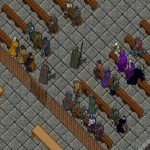Syncaine put up an interesting post about content in MMOs, and how there’s too much focus on one-off (single-player) content as opposed to reusable (multi-player) content. He got that partially right; there is too much focus on one-off content, and on content being intended for single-players in a multi-player environment.
Developer-created content is expensive
The production costs are astronomical for content-driven development, both prior to actually launching the game (which then puts a huge pressure on the game becoming a “box office hit” immediately after launch to recoup as much of the development cost as possible, and after launch – when the developers must fight a never-ending battle to make enough content to keep the hordes of content-greedy players at bay. The players will always consume this content faster than the developers can develop it, and it becomes a battle of attrition to see who tires first – the developers of churning out more quality content or the players of waiting for the next batch for consumption.
However, the answer to the issue that Syncaine raised is not to modify this process to produce re-usable, generic content – or to make grouping “harder” or “less streamlined”. The solution lies in systems-driven design and systems-driven gameplay. Given the right type of systems, the right set of tools and the right amount of freedom, the players can themselves generate content that has the potential to be infinitely more interesting to them than playing through yet another story X created by developer Y. That is not to say that there is no room for developer-created content, but if the consumption of this content becomes the primary focus of the game, the battle has already been lost; the players will expect more of the same and be upset when they run out of such content to consume.
This is not the content you are looking for
I want to make what I feel is an important distinction here, which I don’t see a lot of other people making. I see a clear distinction between player-created content and player-generated content. The former I see as being about giving the players the tools to create their own dungeons, missions, quest NPCs etcetera – which can then be experienced by other players. Since the players are, collectively, more creative and prone to experimentation than a small group of developers will necessarily have to be (due to budget/milestone-constraints), chances are good that somewhere among the flood of content that will be produced by the players (a good chunk of which will be related to giant, flying penises), there will be some real gems, perhaps even some unforgettable master-pieces.
However this is treating the symptom of the problem and not the cause. Outsourcing the work of content-creation from the developers to the players in this manner is not the solution.
Player-generated content
Instead of outsourcing content-creation through player-created content, I wish to see more developers embracing the promotion of player-generated content. I don’t mean content in the traditional MMO sense here, but instead the gameplay that emerges as players utilize the tools built into systems-driven virtual worlds to drive both their characters and said worlds forward. Or sideways. Wherever. I realize that this sounds a bit vague, but bear with me and I will continue on to say that the next logical step we need to take in MMORPG development is to embrace the concept of virtual worlds more closely.
The potential for player-generated content in virtual worlds is… out of this world. To unlock this potential, those virtual worlds require systems. Not just systems that drive combat, but systems for crafting, systems for exploring, systems for inventing stuff, systems for politicking, systems that promote socializing, systems that promote creativity, systems that provide options, choices – systems that make alternative lives possible. The more of these systems that are in place and the more of them that are interconnected in some way or other with other systems, the more opportunities there will be for emergent gameplay to occur. Sometimes this gameplay will go down paths that the developers might not want it to, but this fact should be embraced, not shunned. Instead of restrictions, freedom. Freedom to make the choices that matter to the player – the choices that makes the journey their character is on their own journey.
This reinforces the bond they have with their character and increases their feeling of ownership, not just of said character, but also of the world the character lives in, promoting a pattern of thought that goes… “This is my character. This is my story. This is my world. This is my home.”
You can’t get a better retention device than that.
